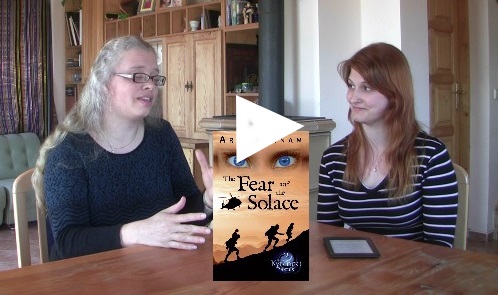Strike a blow against bureaucracy: Freedom for multicultural names in the Czech Republic
/My path to parenthood was a rocky one, slogging through infertility, an Eastern European adoption system and the judgments of many who felt a blind person shouldn't parent in the first place.
As well as those large boulders, there were some small, sharp stones on that road, not barriers but merely unpleasant jabs to endure. These were, for instance, lectures from bureaucrats about how wrong I was--wrong to think I could parent, wrong to adopt, wrong to accept children of another ethnicity, wrong in naming my child...
Creative Commons image by Jason Pratt
That last was one of the final rocks in my shoes, but one that I knew about from the beginning. I had heard rumors about the Czech Republic's name czar, an elderly linguist with the antiquated opinions of the 19th century.
You see the Czech Republic has a name calendar. Each day of the year has been given a name, sometimes two. These were originally the feast days of saints and the custom dates to a time when immigrants were few and knowledge of the world beyond the little valley of Bohemia and the hills of Moravia was very limited.
Name days are still celebrated by many in the Czech Republic. Friends and family members give flowers, cards, chocolate and alcohol to those named after the saint in the calendar. As a result, being given a name that isn't on the calendar could represent a distinct denial of small gifts.
This may have been one of the motivations for appointing a linguistics expert to control all foreign and uncommon names given in the country. Another reason given was to prevent people from having to correct the spelling and pronunciation of others.
I will admit that there are some small perks to this rigid naming system, once you have learned to pronounce all 365 or so names--no small feat with names like Zbyněk, Wilhelmina, Břetislav, Otýlie and Zdesislava--just to name a few. If you are ever called upon to pronounce another person's name without help, you theoretically have no problem.
But the most commonly cited reason is the fear that classmates will ridicule a child with an uncommon name. Those who wished to give their child a common foreign name like Doug had to apply for a permit, while one could cheerfully and freely name a child Bonifác--one extremely rare Czech name that sounds just as ridicule-prone in Czech as it does in English, but which—none the less—gets a day on the calendar (May 14 to be exact).
That's why when I went to name each of my kids and didn't want to choose either the 30-odd actually used names on the Czech calendar--which results in my children's classes having only three names to share between eight girls and the like--or any of the ridiculous ones not in general use, I had to approach the name czar with polite pleas of supplication and suffer through one last lecture about my wrongness.
The name czar warned me that my children, named Shaye and Marik, would suffer terribly in school because of their odd foreign names. In both instances, the name czar originally denied my request and I had to document the common use of the names in other countries.
Beyond the fairly popular English name "Shaye", "Marik" is a Slovak variant of the common Czech Marek and it saves my son from sharing his name completely with two other kids in his year. But the name czar did not like my choices.
Exhausted from years of this kind of ordeal in the adoption process and still unsure whether or not the authorities could revoke our children if we were too disobedient, my husband and I bowed our heads, produced all the needed paperwork and stuck to fairly standard names even when applying for something different.
But not everyone is such a lightweight, thankfully. Another mixed couple--an American of Native American Indian background and her Czech husband--won their two-year court battle with the name czar this past summer. They had to go all the way to the Czech Constitutional Court, the highest court in the land.
Tthe court struck down the name czar and the power to intimidate and harass families of diverse cultures. The court decreed that the law says only that parents must provide documentation, such as a mention on a baby-names website or another registry of names or evidence that a name has been used in the past. Upon the filing of this documentation with a county clerk, the parents’ name choice will be automatically accepted.
My children are well into their school years with their mildly unusual names and they don't report any major difficulties. My daughter has mentioned that mean boys will occasionally chant bastardized versions of her name, but they do it to all the girls. She is mildly dismayed that her name rhymes with so many things because this gives the boys a bit more fodder.
Still she is strong-willed and does not want to use her bland second name Hana (mostly given to her to ensure that she would not miss out on name-day treats).
My son, on the other hand, is slightly sad that his does not rhyme with anything in English or even that much in Czech. I have had to correct officials a few times when they heard his name and assumed it was the more common Marek, instead of Marik, but my son is happy with is little bit of uniqueness and that is what matters in the long run.
I am relieved to hear of this small victory for common sense over bureaucracy and grateful to those who fought the long fight in court.
























